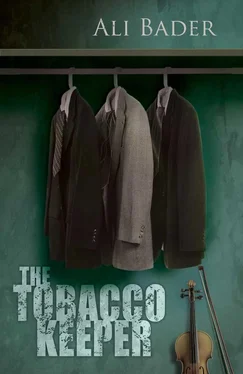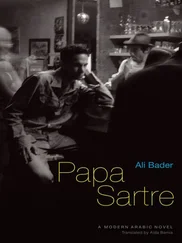The people in his neighbourhood called him ‘Comrade’ because of his great attachment to the communist movement and his support for the left. His leftist sympathies were not restricted to Iraqis, but included all people of the world. This internationalist Jew felt himself united with workers everywhere, whether labourers with hands as rough as crocodile skin or porters working in the blazing sun. He was detained and jailed more than once, but never abandoned his convictions. He was saturated with politics like a sponge with water. When walking along the pavement with his thin bamboo cane he never met anyone without talking to him about political issues. At first he would look at his interlocutor with his cloudy, dreamy eyes and would then address him. He saw in every item of news a political angle. He interpreted every bit of news in the light of the state’s economic policies, parliamentary affairs, the constitution, or the difference between socialism and capitalism. His jacket pockets were always bulging with newspapers and magazines. Sami firmly believed that he was entrusted with one duty only, that of enlightening people about their rights.
So there was Sami Saleh, alert but silent and dreaming, lost in his habitual daily walk. In the spring he would inhale the pollen dust and sneeze; in summer, he would caress the wood carvings on doors and the plants as though saying goodbye to them; in winter, he would carry his dripping umbrella and head to Salman café in Ras al-Aqd. His feet would be wet and his body shivering with the cold; he would sneeze and wipe his nose with his hand because he had no handkerchief. Once, he saw a huge black dog standing in the rain, looking at him with sad eyes, its body soaked. He dragged it home behind him through the side streets, the wet, trembling, black dog walking dejectedly behind him. The residents of Al-Torah neighbourhood knew that Sami bin Saleh and his family kept no dogs. The children stood on the rooftops or on the muddy ground in front of the shops, houses and cafés, and screamed out, ‘Comrade Sami, what’s that dog doing running after you?’
‘He’s better and braver than you,’ he replied scornfully. ‘I told him about his miserable life, and he’s decided to join the revolutionary movement.’
When he arrived home, Huri came out of the yard wearing her apron and her round glasses. Her hair was unkempt, and her sallow face looked tired and sickly. When she saw him, she stopped in her tracks, her eyes as wide as they would go and her hands held high as though transfixed. In one hand she held a large wooden spoon that she used for cooking okra.
She screamed in his face. ‘Good God, Sami. What’s that you’re bringing home? Haven’t I got enough with your children?’
‘Huri, did you want me to leave it to die in the rain?’
That was how his father lived. After his father’s death, Yousef never removed his coat from its hanger. He kept his hats, books, umbrellas, raincoats and boots until the day he emigrated in 1950.
(There were many anecdotes about his father. In his letters, Yousef penned a lovely portrait of his childhood in spite of the poverty of the family. This was particularly true of the letters he wrote from Tehran between August 1954 and July 1955. The 1956 letters, in contrast, spoke of his artistic life and how he’d joined the Iranian National Symphony Orchestra.)
The musician was in every way like his mother. Since childhood, he’d been captivated by her: her long fingers, her slender figure and her lovely bosom that showed above the low neckline of her dress. He was enchanted by a vision of her in her bedroom, for he saw in her a woman who never lost her femininity to motherhood.
This was how he saw her:
A large mirror with a teak frame hung prominently on the wall of the room. She was standing in front of it and gazing at her figure before taking him out to a concert. He sensed her beauty and femininity and marvelled at her lovely clothes. Although his family was not rich, his mother had the demeanour of a great aristocratic lady. She sewed her beautiful clothes on a Singer sewing machine in her room. Ibrahim Naji Shameel, the wealthy co-owner of the Juri pharmacy who had once been in love with her, would provide the tickets for the concerts to which she took her son in all humility and modesty.
Yousef entered the concert hall: his body was diminutive, his legs looking so thin in his blue shorts and his white shirt far too large for him. His eyes had a dream-like quality and his face was peaceful and beautiful. Throughout the time they sat there, he remained silent and solemn. He was more overawed than joyful. This was what his mother noticed. Classical music for him was akin to worship or prayer. He passed the time in silence, his eyes fixedly following the melodies as they intertwined. From the moment the music started he paid no attention to what went on around him. He was hopelessly romantic, for he held on to art as the final thread that attached him to life. It was clear that he would continue his musical education at the Iraqi music conservatory, which at that time was directed by Julien Hertz. Yousef would later help to create the Baghdad Philharmonic Society together with Boutros Hanna, Sandu Albu, Jameel Said and André Thoerè, with whom he continued to work until his emigration to Israel. The greatest and most important turning point in Yousef Sami Saleh’s life was the scholarship he received at the age of fifteen from a wealthy Baghdadi, to travel to Moscow. There he had the chance to listen to orchestral pieces and chamber music at the Bolshoi auditoriums. He also listened to Rachmaninov and visited the Russian Composers’ Society, the Academy of Music and the Opera House in the city of Bryansk. This visit made a great impression on him; indeed, it influenced his entire life. It was the first time that he’d seen such a large number of musicians and concertgoers. They dazzled him with their looks and their handsome outfits. He admired them so much that he wanted to follow in their footsteps and become one of them. So he bought a coat with large pockets, some elegant round glassses with gold frames, a pair of leather shoes and a crimson bow tie. He was so fascinated with the musicians that he met and their long beards that he wished one day to grow his beard long, too.
Yousef wasn’t particularly handsome. He had high cheekbones, a large mouth, a slightly small nose and an expressive, sad face. His laugh was muted and he didn’t speak much. On his return home, he felt he had grown up and become a man, even though he was barely fifteen. At that time he was overwhelmed by the most profound feeling of love, which struck him like an earthquake, demolishing his defences and leaving him in ruins. This was his love for his cousin Gladys, which woke him up every morning at dawn to the cockadoodledo coming from Moshe’s house, the tailor in Tekeya market, or the chirping of the swallows in the eucalyptus trees. So, from dawn until sunrise, he would lie in his bedroom, awake and alert, thinking. As soon as an idea took hold in his mind, he would pick up his violin and express the thought in musical notes. Yousef realized without any shred of doubt that it was love that made him play with such intensity of feeling. It made him play with true passion and drew melodies from the depths of his heart. He knew that he was in the grip of a true and violent passion. He knew he was descending at full speed to the lowest depths. But he felt that nobody around him cared for his music. His beloved Gladys did not care either. Nor did any other girl that he had undressed in his mind or dreamt of in bed until he gasped in ecstasy.
But was his love in vain?
Not at all. For without love, he would not have played with such intensity, with such feeling, with every fibre of his being. He struggled hard to become a great musician. He willingly gave up all the choices and pleasures that life offered him, for he wanted only to be a musician. In Moscow, he stood for the first time in his life in front of the greatest conductor in the world: a thin man with a long beard and a face as red as wine, who wore a black suit and a crimson bowtie. He advised Yousef to find artistic inspiration from his own people and nowhere else.
Читать дальше












